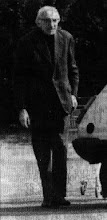I want to suggest certain ways in which some reflections by P.M.S. Hacker on the distinction between object and event cast light on what it is that Badiou understands by the event. Obviously enough, Hacker, like Austin and Wittgenstein, is a philosopher of what Alain Badiou calls, dismissively, ‘the linguistic turn’. However, this point need not be taken too seriously. The issues Hacker raises concerning and object and event have a decided bearing on the relation between being and event.
Hacker points out that while objects occupy space, events occur in space, at a place: they do not fill or occupy space. He writes: ‘Two objects cannot occupy the same place at the same time, but two distinct events may occur simultaneously at the same place, as when an object in the fire simultaneously gets hotter and changes colour’. Events are unlike material objects in that they do not consist of matter. Not consisting of matter they have no size or texture, and they are neither solid nor not-solid. Since events do not occupy space as objects do, they are neither two- nor three-dimensional. While it is true that events need space in which to take place, they do not have dimensions. The component parts of an object are typically thought of as being spatial parts, and hence they are smaller than the whole of which they are parts. As Hacker indicates, the ‘analogue of part for an event is the notion of the phase’. As an object is made up of the sum of its parts, suitably ordered in space, an event is made up of the sum of its phases, appropriately ordered in time. But, as Hacker points out, ‘these “parts” of events are not … smaller than the event of which they are parts, but shorter (temporally) than it’.
If we take this distinction for what it is, a distinction in grammar (in both Wittgenstein’s and Austin’s senses of that term, which are not unrelated) between the spatial composition of objects into parts, and the temporal division of events into phases, then it makes no sense to say that an event is a multiple. That is, unlike an object, an event is not intelligibly to be understood as constituted in a way that lends itself to being described as a set, whether finite or infinite. Set theory is not designed to address that which is temporally constituted: an event, being thus temporally constituted, has no parts, and is thus not divisible into sets, subsets or power sets. Given that, for Badiou, mathematics (set theory) is ontology, it would thus seem that ontology has no significant bearing on the elucidation of what an event is. Now, Badiou allows for this: an event, after all, is a set that includes itself, a set that therefore violates one of the basic axioms of ZF set theory. To put this another way, it is a multiple that is indiscernible within the situation in which it occurs. An event is a generic set, a set which is not recognisable within the established parameters of knowledge as these are laid down by standard set theory, but nonetheless a set, albeit non-constructible.
That there is a difficulty in thus inscribing events among objects becomes clear if we think about how the attribution of perceptual qualities to events differs from the attribution of perceptual qualities to objects. As Hacker reminds us, one can watch the falling of leaves or the performance of a play. ‘But events have neither shape nor colour, just because they do not have spatial dimensions, do not fill space, and do not consist of stuff.’ How is it then that we can see events? To think of an event as a colourless and shapeless object is to think of what is an invisible object! However, events are not objects, and they are not amorphous or colourless. It simply makes no sense to attribute shape or colour to them. ‘A colourful event is not a multi-coloured event, but an event which consists in various transformations of vari-coloured objects or production of multi-coloured flashes, as in a firework display. To observe an event is to see something happening to certain material objects that are undergoing various changes. I may observe the event of the poker’s becoming hot. The poker changes from black to glowing red, but the event of its becoming red does not change from black to red, it is the change from black to red.’
In my previous entry on this matter, I drew attention to Peter Dews’ review of Badiou. Dews cites from Wittgenstein:
Even where the feeling that arouses joy is localised, joy is not: if for example we rejoice in the smell of a flower. – Joy is manifested in facial expression, in behaviour. (But we do not say that we are joyful in our faces.)
“But I do have a real feeling of joy!” Yes, when you are glad you really are glad. And of course joy is not joyful behaviour, nor yet a feeling around the corners of the mouth and the eyes.
“But surely joy designates an inward thing.” No. “Joy” designates nothing at all. Neither any inward or any outward thing. [Zettel §§486-87]
Dews remarks: ‘Like joy, the Badiouian event cannot be designated—and can be located neither in mental nor physical space. Indeed, one must surely conclude that joy is an event’. But in that case, events are very common: they ‘make up the very texture of the human world’, a point to which Hacker’s discussion gives full support.
A number of questions arise. To begin with, if joy is an event in Badiou’s sense (i.e. his account can be applied to it), then presumably the heating of the poker is also an event in Badiou’s sense, along with Hacker’s other examples (which include the French Revolution). How then can set theory, concerned as it is with multiples (sets and subsets, wholes and parts of wholes) illuminate the nature of an event, which, thus understood, is precisely not a multiple? That is, how would Badiou describe the kinds of event to which Dews and Hacker have given consideration? Again, on what principles are the events that Badiou privileges, Christ’s Resurrection, the French Revolution, the Cultural Revolution, for example, selected? Events are the stuff of life. Why should only these few, very rare, events be selected as events? Is it that fidelity is due to them? The suspicion must arise that the selection is the result of a certain political predetermination. Badiou’s ontology is static, the result of his set-theoretical parti pris. Once the original decision was made to cast ontology in mathematical form (Cantorian form), the event arises as that violates or ruptures the static nature of being as being. The event bears with it novelty, revolution. That there are problems with Badiou’s original decision is something that Peter Osborne has discussed, and I have referred to that discussion in an earlier entry. There is another worry that I have: in his book on St Paul, Badiou takes Christ’s Resurrection as exemplary of what an event is. And yet for him this event did not occur: it is, he says, ‘a fable’. In what sense is an event that has not occurred an event?
These are questions, not objections. It may be that Badiou’s achievement is to raise, in a mode not unlike that of Wittgenstein, problems that concern the foundations of philosophy. If one were to say of such an achievement that it is therapeutic, in the sense that Wittgenstein's philosophy is therapeutic, then one would also have to say that, if we are to understand Badiou himself, then that understanding is itself an event, the event of recognising his propositions for what they are, that is, nonsensical.
References:
Dews, Peter. A review of Being and Event, tr. Oliver Feltham (Continuum, 2006), in Notre Dame Philosophy Reviews 2008.02.18. [online]
Hacker, P.M.S. ‘Events and Objects in Space and Time’, Mind 91 (1982), 1-19.
Hacker, P.M.S. ‘Events, Ontology and Grammar’, Philosophy 57 (1982), 477-486.
Osborne, Peter. ‘Neo-classic: Alain Badou’s Being and Event’, Radical Philosophy, 142 (March/April 2007), 19-29.
The Virtues of Knowledge
7 years ago


